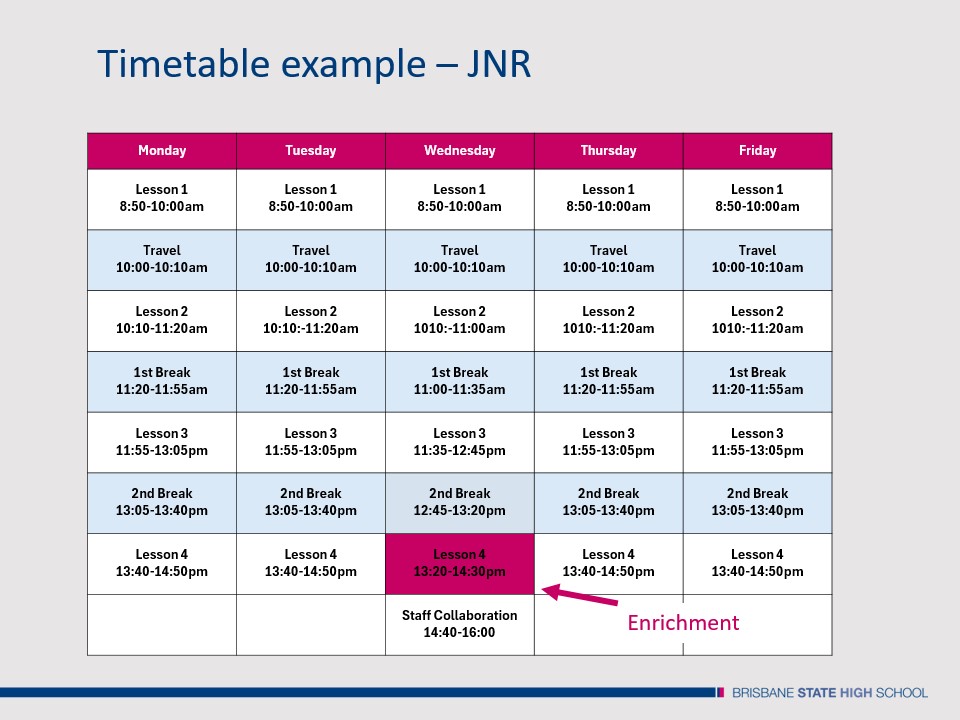Background
As you may be aware, staff at BSHS for a period of 18 months have been reviewing our current weekly structure and timetable.
Why?
There has been a strong feeling among staff and students that the current weekly structure is not as effective or impactful as it could be. Our ability to offer appropriate facilities for all students and to staff outside of curriculum opportunities is an increasing challenge due to high enrolment and resourcing pressures. We understand what works for our students and it is important to find a solution that sustains the great work and values that BSHS encompasses. A more flexible timetable will allow us to address these issues and provide more appropriate learning experiences for the betterment of student outcomes and wellbeing.
Current Model
A reminder of the current weekly structure and timetable:
Limitations of the current weekly structure:
· A 1 hour and 45 minutes every Monday for all students to have a lunch break and attend an assembly. (Ineffective use of time).
· All 3600 students are required to be on site, at the same time every day. (Not sustainable as the school roll continues to grow / unstainable pressure on infrastructure and facilities).
· No independent senior student learning time. (Essential for students in the senior school as they prepare for tertiary study learning environment and the dynamic vocational world where they will be fully accountable for their own progression and outcomes).
Proposed Model (Flex)
The proposed new weekly structure and timetable model is as follows:
Advantages:
· Junior students will have more effective learning environments through equitable use of on-site facilities. (Junior students accessing Science labs, Drama spaces, gym, etc).
· Senior students will receive flexible learning time. “Flex" learning time is not free time. The expectation is that students are working towards specific task completion, their assessment deadlines, accessing school resources (such as student services), attending exams or events. The guiding principle behind this “Flex" time is the development of student agency, whereby senior students make prudent decisions on the most effective use of time to support their studies.
· Less impact upon student learning. Due to the new weekly structure, examinations will minimise classroom relocations for all students and avoid senior students from missing multiple lessons during assessment time.
· Retains staff collaborative, professional development time to support and enhance student learning and outcomes.
· Small change to start and finish times to minimise impact upon daily routines.
· Assemblies will occur as appropriate within ARC (Pastoral Period) rather than on a weekly basis. This will allow for a personalised and more appropriate learning environment and delivery.
· Students in Years 7 to 9 will now have an opportunity to participate in an 'Enrichment' period of their choosing, e.g. extension / masterclasses, STEM projects, tutorials, workshops, independent study and a range of co-curricular and extra-curricular activities in sport, music and culture. More information will be forthcoming as we move through consultation to implementation.
· Additional flexibility for academic mentoring, parent-teacher meetings/discussions, workshops, tutorials, masterclasses, specific task completion, supervised study and assessment opportunities for senior school students during the flexible learning time.
· More strategic use of human resources to fulfil BSHS staffing, curriculum and operational goals.
NB: Notes
· Within this timetable/weekly structure model, students in Years 7 to 9 are on-site for slightly longer, than as per the current model.
· The school day starts slightly earlier, i.e. 8:50am.
· Within this model, students in Years 10 to 12, leave school on Wednesday afternoon during the second lunch break (between 12:45 and 1:20pm) on a weekly basis.
· Students in the senior school, Years 10 to 12, will have one additional early afternoon finish (Refer Appendix A) per week. This will change on a monitored and rotational basis over a three-week period, ensuring no subject is disadvantaged. This is termed 'flex time', when students will be either learning off-site or be offered a variety of workshops, tutorials, 'External' presentations, specific task completion, supervised time onsite (example: library spaces for independent study) or required for assessment completion.
· Before the start of each of the four terms in the school year, parents/caregivers, students and staff will be given clear communication clarifying the details of the 'flex' schedule for each of senior school year groups for that particular term. This will be reflected in Compass; students will see their weekly schedule updated with the relevant events or exam. When an event or exam is placed into a student schedule, attendance will be taken and is mandatory.
Junior Timetable Example:

Senior Timetable Examples:
While senior timetables follow the same structure as junior timetables, their flexible rotations differ. Please refer to the appropriate year-level video to see how it affects your student.
Year 10 Timetable Structure:
Year 11 Timetable Structure:
Year 12 Timetable Structure: